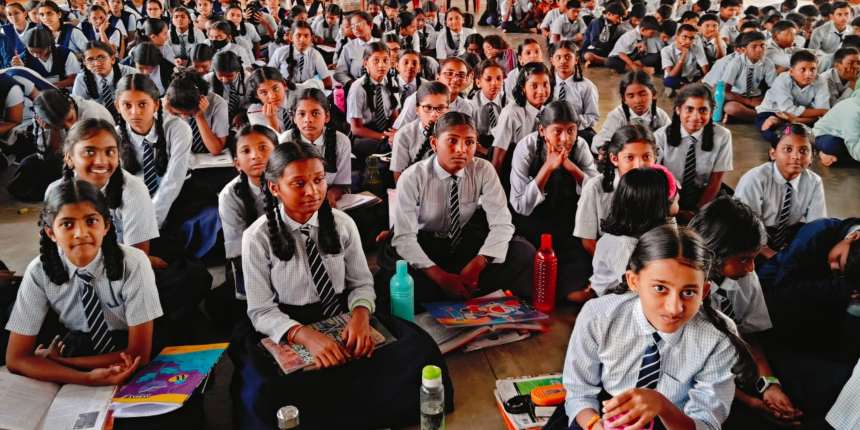Haryana board requires most ‘recall’, UP board most ‘understanding’: NCERT PARAKH on state board questions
Atul Krishna | July 29, 2024 | 09:41 PM IST | 3 mins read
NCERT PARAKH’s analysis of private and state board question papers compares difficult levels – easy, medium or hard – and whether questions require rote learning.
HBSE Class 12 Syllabus 2025-26
Get the updated HBSE Class 12 Syllabus 2025-26 with subject-wise topics and marking scheme to plan your preparation and score better in board exams.
Download EBook
NEW DELHI: The question papers set by the Board of School Education Haryana, Bhiwani (HBSE or BSEH) requires the most “recall” of information – essentially, rote learning – and the ones set by the Uttar Pradesh Madhyamik Shiksha Parishad (UPMSP or UP board) require the most “understanding”, according to analysis of question papers by PARAKH, a unit of the National Council of Educational Research and Training (NCERT).
New: HBSE Class 12 Syllabus 2025-26
Don't Miss: HBSE Class 12 Sample Papers
Also See: Formula Sheet: Maths | Physics | Chemistry
For the analysis, the Performance Assessment, Review, and Analysis of Knowledge for Holistic Development (PARAKH) compared the question papers set across 32 state boards and drew up a comparison of the weightages to questions of three difficulty levels – easy, medium and hard – in some of them.
The analysis found that the Chhattisgarh Board of Secondary Education (CGBSE) had assigned the most marks to easier questions (47.62%) and the Tripura Board of Secondary Education to ‘hard’ questions (66.67%).
However, the Chhattisgarh Board had one of the highest percentage of difficult questions with 44.44% and very few medium-difficulty ones.
In the draft report, Establishing Equivalence Across Education Boards, made public on July 29, suggested limiting the weightage of the Class 12 public exam to 40% in the final board result and assigning the remaining 60% to Classes 9-11.
Question Papers Compared: Easy, medium, hard
The NCERT PARAKH analysis shows that the Board of Secondary Education Odisha and the Council for the Indian School Certificate Examinations (CISCE) had assigned the largest weightage to easy questions after the Chhattisgarh board, with 40% and 38.39%, respectively.
5 Boards: % weightage to ‘easy’ questions
Board | % easy questions |
Chhattisgarh Board of Secondary Education | 47.62 |
Board of Secondary Education Odisha | 40 |
CISCE | 38.39 |
Himachal Pradesh Board of School Education | 34.38 |
Tripura Board of Secondary Education | 33.33 |
In question papers set by the Board of School Education Uttarakhand (UBSE Ramnagar), medium difficulty questions carried as much as 97.44% of the marks, implying that a very small part of the paper - under 3% - was easy. Gujarat Board (86.27%) and Kerala board (73.08%) question papers assigned the second and third highest weightage to medium-difficulty questions.
5 State Boards: % weightage to ‘medium’ questions
Board | % medium questions |
Uttarakhand Board of Secondary Education | 97.44 |
Gujarat Board of Secondary Education | 86.27 |
Kerala Board of Public Examination | 73.08 |
Punjab School Education Board | 67.09 |
Nagaland Board of Secondary Education | 59.2 |
Maharashtra State Board of Secondary and Higher Secondary Education, or MSBSHSE, (53.57%) and the Goa Board of Secondary Education (44.66%) were the other states with the largest percentage of hard questions.
5 State Boards: % weightage to ‘hard’ questions
Board | % hard questions |
Tripura Board of Secondary Education | 66.67 |
Maharashtra State Board of Secondary and Higher Secondary Education | 53.57 |
Goa Board of Secondary Education | 44.66 |
Chhattisgarh Board of Secondary Education | 44.44 |
West Bengal Board of Secondary Education | 33.33 |
Rote learning
The Board of School Education Haryana Bhiwani (HBSE) had the largest percentage of questions – 64.71% – requiring information recall followed by the Goa Board of Secondary Education (57.89%) and Himachal Pradesh Board of School Education (53.13%). The Board of Secondary Education Odisha also had more than 50% of questions that required information recall.
The PARAKH report recommended that questions that require recall of information should be reduced as it promotes “rote memorisation”, something that the National Education Policy (NEP 2020) aims to reduce.
The Uttar Pradesh Madhyamik Shiksha Parishad (87.76%), the Nagaland Board of Secondary Education (73.02%), and the Tripura Board of Secondary Education (61.76%) had the most questions that required “understanding” of concepts.
The Board of Secondary Education Manipur (50%), West Bengal Board of Secondary Education (45%), and the Maharashtra State Board of Secondary and Higher Secondary Education (41.86%) had the highest percentage of questions that require application of ideas.
Follow us for the latest education news on colleges and universities, admission, courses, exams, research, education policies, study abroad and more..
To get in touch, write to us at news@careers360.com.